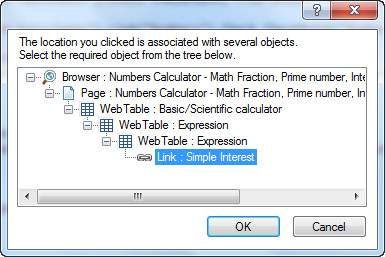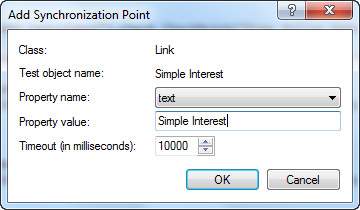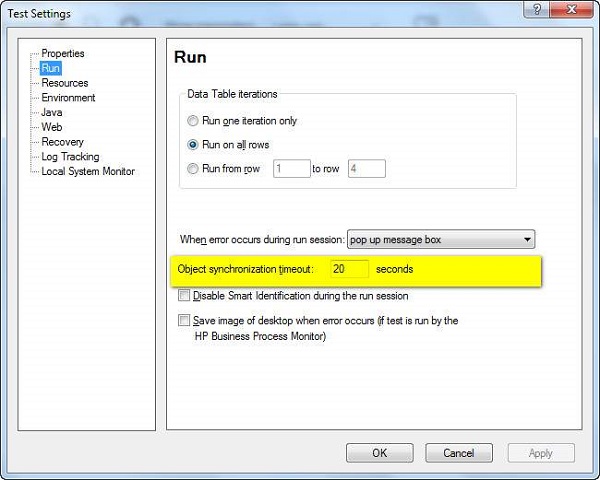Source: http://www.tutorialspoint.com/qtp/qtp_synchronization.htm
What is Synchronization?
Synchronization point is the time interface between Tool and Application under test. Synchronization point is a feature to specify delay time between one step and another of the test script.For Example, clicking on a link may load the page is 1 second, sometimes 5 seconds or even it might take 10 seconds to load it completely. It depends on various factors such as the application server response time, network bandwidth , client system capabilities etc.
If the time is varying then the script will fail unless the tester handles these time differences intelligently.
Ways to Insert Sync Point:
- WaitProperty
- Exist
- Wait
- Sync(only for web based apps)
- Inserting QTP Inbuilt Synchronization points.
Method 1: WaitProperty
WaitProperty is a method that takes the property name, Value and Timeout value as input to perform the sync. It is a dynamic wait and hence this option is encouraged.' Method 1 - WaitProperty with 25 seconds
Dim obj
Set obj = Browser("Math Calculator").Page("Math Calculator")
obj.Link("Numbers").Click
obj.Link("Simple Interest").WaitProperty "text", "Simple Interest",25000
obj.Link("Simple Interest").Click
Method 2: Exist
Exist is a method that takes the Timeout value as input to perform the sync. Again it is a dynamic wait and hence this option is encouraged.' Method 2 : Exist Timeout - 30 Seconds
Dim obj
Set obj = Browser("Math Calculator").Page("Math Calculator")
obj.Link("Numbers").Click
If obj.Link("Simple Interest").Exist(30) Then
obj.Link("Simple Interest").Click
Else
Print "Link NOT Available"
End IF
Method 3: Wait
Wait is a hardcoded sync point which waits independent of the event happened or NOT. Hence usage of Wait is discouraged and can be used for shorter wait time such as 1 or 2 seconds.' Method 3 : Wait Timeout - 30 Seconds
Dim obj
Set obj = Browser("Math Calculator").Page("Math Calculator")
obj.Link("Numbers").Click
wait(30)
Browser("Math Calculator").Page("Math Calculator").Link("Simple Interest").Click
Method 4: Sync Method
Sync Method can be used only for web applications where there is always a lag between page loads.' Method 4 :
Dim obj
Set obj = Browser("Math Calculator").Page("Math Calculator")
obj.Link("Numbers").Click
Browser("Math Calculator").Sync
Browser("Math Calculator").Page("Math Calculator").Link("Simple Interest").Click
Method 5 : Inserting QTP Inbuilt Synchronization points:
Step 1 : Get into Recording Mode. This Option Would be Disabled if the user is NOT in Recording Mode.Step 2 : Goto "Design" → "Synchronization Point" .
Step 3 : We need to Select the object which we want to be the Sync Point. After Selecting the object, object window opens as shown below:

Step 4 : Click Ok, the "Add Synchronization Window" Opens up. Select the Property, Value and Time out value and click ok as shown below:

Step 5 : The Script would be generated as shown below which is the same as that of the WaitProperty(Method 1) that we had already discussed:
Browser("Math Calculator").Page("Math Calculator").Link("Numbers").Click Browser("Math Calculator").Page("Math Calculator").Link("Simple Interest").WaitProperty "text", "Simple Interest", 10000
Default Synchronization:
When user hasn't used any of the above sync methods, still QTP has inbuild Object synchronization timeout which can be adjusted by the user.Navigate to "File" >> "Settings" >> Run Tab >> Object Synchronization Time out as shown below.

No comments:
Post a Comment